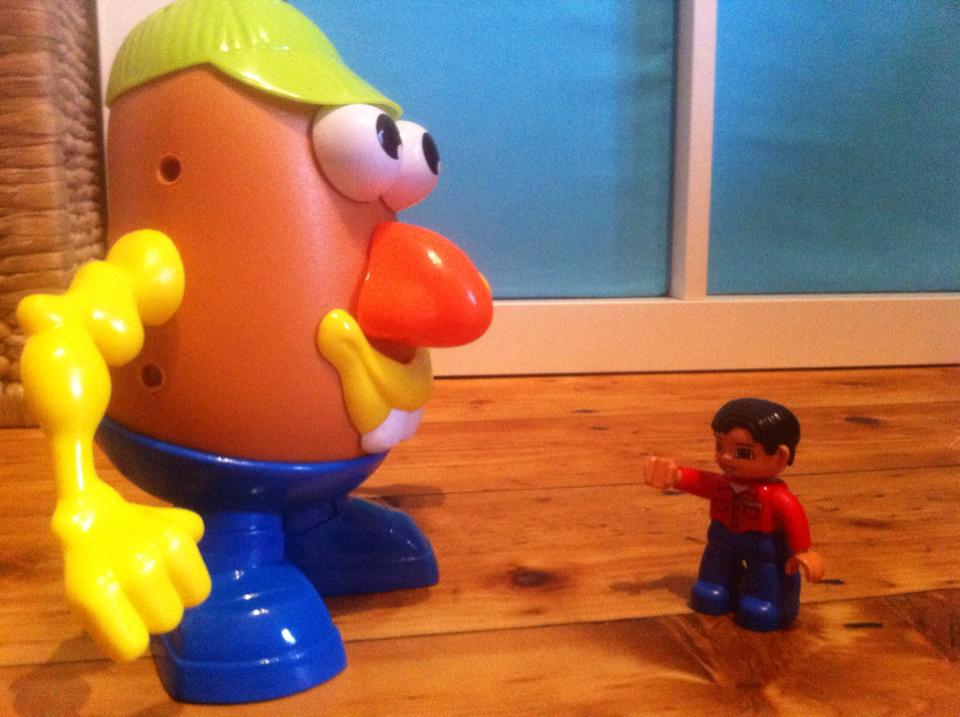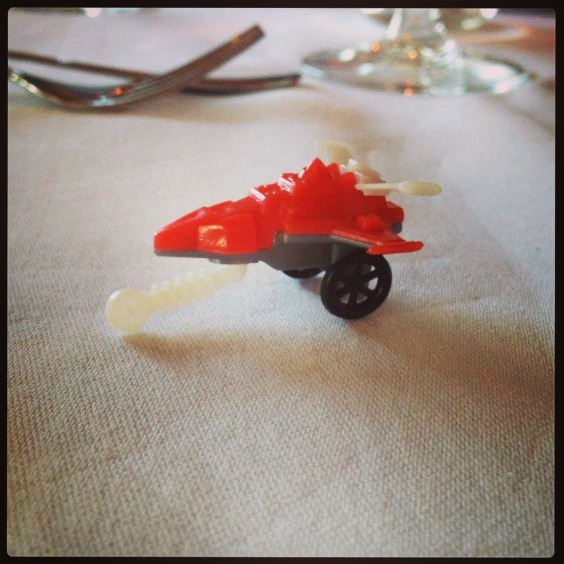
There are certain core skills that you need in life in order to be a respectable human being.
I have very few of these.
I can’t cook anything much more complicated than toast (at school, I made a sponge cake which, I’m not kidding, tasted of fish. It was a miracle of culinary physics. And cupcakes that bounced). I was not very successful with woodwork, either. I once made a bird-table that more closely resembled some kind of fiendish, spikey wooden venus flytrap (which birds, sensibly, avoided). Trying to add a new circuit board to a computer resulted in an actual fire.
One thing I did try to master was fly-fishing. My father is very skilled at it. He used to make his own flies too, which in angling circles is the equivalent of being an intergalactic space ninja. But fishing expeditions with me were very different, being mainly afternoons spent untangling the line from trees, fences and people. The only time I ever actually caught something was when I managed to land a sick fish in my net, which is the pretty unsporting equivalent of going big game hunting at the zoo. In a tank.
But I did learn something interesting about trout. And this is that trout lurk. They hover in the river, gobbling up anything that comes near them. Sometimes you can see them, and sometimes you can’t. But they’re there – lurking.
Something else that lurks, beneath the waters of the church, is a relatively forbidden subject – uncertainty about whether God is really there or not.
The Trout of Doubt
You rarely hear sermons about the Trout. Sermons about the existence of God tend to be evangelistic talks. Which is great, but by front-loading the church machine like this we hoover up new believers but don’t necessarily retro-fit anything at the other end of the pipeline for when they start to wonder.
Our language about this issue is also weird. We seem to imply that all Christians are in a permanent state of rock-solid belief (or at least, they should be). We talk about ‘being saved’, or ‘conversion’, as if once someone has said the magic words ‘I accept you into my life, Jesus,’ then that’s it. Instant. No more internal process, one more Christian, on to the next soul. We’ve even given uncertainty a label, ‘doubt’ – which is a term that’s not just loaded, it’s practically bursting. The wheels underneath it are buckling.
As soon as we use the word ‘doubt’, it’s like we’re diagnosing a spiritual disease. A sort of Christian mental illness. This is unhelpful in two ways – firstly, it marks it out as a condition with a start and a finish. As if it comes on suddenly, like flu or food poisoning, and hopefully another Christian will find a cure for you by saying the right thing ‘for you’, and you’ll stop doubting and return to your healthy religious state. And secondly, it stigmatises it. It’s undesirable. It’s not in the Happy Box with words like ‘worship’ and ‘joyful’, it’s not something that a Christian wants to admit to other Christians.
The effect is heightened for leaders, missionaries and long-term Christians. They often worry that if they express any hint of doubt, then the carpet will be pulled out from underneath them (revealing, presumably, a flume-tube going all the way to Hell with a demon attendant offering complimentary towels at the other end). Or perhaps that they will infect others with doubt, as if it’s the Ebola virus and unless they quarrantine their thoughts they will become Patient Zero in an outbreak that will bring down all of Christendom.
The spectrum of doubt
Let’s blow the lid on this, and suggest a startling idea – all Christians are sitting somewhere on a spectrum of doubt at any one time. At one end is the conviction that God does not exist and it’s all a load of nonsense, and at the other is a wild-eyed, near-psychotic conviction that God is more real that Burger King.
And nobody is ever at either extreme. Even self-described atheists have a part of them that thinks “but what if…?” (and they wouldn’t be very good scientists if they didn’t). Instead, in response to the factors acting on us at any one time, we slide along this spectrum throughout our lives. We might move in either direction, by an inch or a mile, over several years or in the space of a day. In essence, all Christians are in a greater or lesser state of worry that they might be wrong, the whole time. All people are, whether they’re religious or not.
Living life on the spectrum
In 2005, a behavioural economist called Dan Ariely carried out an amazing psychological experiment. He asked some students to predict what their opinions would be about several subjects if they were placed into a strong emotional state. He then placed them in such a state, and asked them again. He found massive differences between what the students thought their opinions were going to be, and what their opinions actually turned out to be.
What this suggests is that our world-view is heavily altered by the emotions we’re experiencing at the time.
So if your view on the existence of God is based on cold logic (like a theological cyborg), that might not satisfy you when you’re in an intense emotional place (such as a bereavement). But similarly, an answer which might be of some comfort when you feel emotional may not satisfy you when you return to your day-to-day neutral state. We go through different emotional states throughout our lives, such as the religious devotion we feel when worshipping in church, the neutral day-to-day state when we’re just going about, doing our thing, and then finally the emotionally-heavy one when we’re faced with something frightening, threatening or worrying.
What Dan’s research might imply is that the assurance of God’s existence we might have in any one of those states may not automatically carry through to the others.
Faith is like a womble
So part of living life on the spectrum is recognising that faith is a flexible and dynamic creature that has to adapt to the habitat in which it finds itself. Like a womble.

The fact that you doubt is healthy. Really healthy. It means you’re not crazy. It means you don’t fall for just anything. And so that makes the faith you do have more valuable.
And by the same token, the fact that you recognise a need to consider what might exist beyond our physical senses is equally healthy, especially given that modern studies show that we have too much confidence in our perception of them (some, for example, show that we only actually notice 0.045% of what our senses pick up – remember the gorilla Youtube video?).
If you find yourself moving along the spectrum, embrace it. To quote Isaiah 43:19 shamelessly out of context:
See, I am doing a new thing! Now it springs up; do you not perceive it? I am making a way in the wilderness and streams in the wasteland.
Your faith is finding itself having to adapt to a new habitat, a new time of life. It’s normal. Don’t be frightened, don’t worry, and certainly don’t give up.
Relax. This is part of the journey.






 I’ve been pretty shocked to see that so many Christians voted for Trump, that Christian leaders have endorsed or failed to challenge him, and that many Christians appear to be deploying a ‘coping mechanism’ by hoping that he is, indeed, ‘God’s’ candidate. Equally, I am sure that there are plenty of evangelical Christians who might be surprised at my Christian stance on matters like marriage equality and abortion.
I’ve been pretty shocked to see that so many Christians voted for Trump, that Christian leaders have endorsed or failed to challenge him, and that many Christians appear to be deploying a ‘coping mechanism’ by hoping that he is, indeed, ‘God’s’ candidate. Equally, I am sure that there are plenty of evangelical Christians who might be surprised at my Christian stance on matters like marriage equality and abortion. The answer is, quite easily. Humans are not necessarily rational or linear decision-makers. How we define, prioritise and live out the values we draw from the Bible are influenced by our personalities (check out frameworks like
The answer is, quite easily. Humans are not necessarily rational or linear decision-makers. How we define, prioritise and live out the values we draw from the Bible are influenced by our personalities (check out frameworks like  The Christian faith has a small set of core beliefs, and many secondary beliefs. To be a Christian, you need to adhere to those core beliefs (e.g. check out the
The Christian faith has a small set of core beliefs, and many secondary beliefs. To be a Christian, you need to adhere to those core beliefs (e.g. check out the  Sorry reader, neither you nor the people you disagree with are truly rational. Read up on how your decisions are impacted by hidden factors, with authors like
Sorry reader, neither you nor the people you disagree with are truly rational. Read up on how your decisions are impacted by hidden factors, with authors like  Many Christians really need to spend some time learning. Our faith is 2,000 years old, and what we think the New Testament (and indeed, Old Testament) means should be informed by years of academic disciplines like palaeography, textual criticism, archaeology and historical criticism. How the Bible came to be, how it gets to us, and how to relate to its constituent parts is key to building your understanding of it. Consider:
Many Christians really need to spend some time learning. Our faith is 2,000 years old, and what we think the New Testament (and indeed, Old Testament) means should be informed by years of academic disciplines like palaeography, textual criticism, archaeology and historical criticism. How the Bible came to be, how it gets to us, and how to relate to its constituent parts is key to building your understanding of it. Consider: Don’t enter debates – online or in person – just to win. How many Facebook posts read ‘oh yeah, yeah you are right, I’ll shush now. Thanks for correcting me, Yoda’? I can’t think of many times that a Christian has been argued into believing in one thing or another.
Don’t enter debates – online or in person – just to win. How many Facebook posts read ‘oh yeah, yeah you are right, I’ll shush now. Thanks for correcting me, Yoda’? I can’t think of many times that a Christian has been argued into believing in one thing or another. The church needs to be comfortable, now, with people disagreeing. Pleas for unity when a candidate with an oppressive election platform has won are pleas for obedience. Some of us will fight Trump’s policies, Brexit, the political and cultural shifts arguably behind both, and other things because we find it hard to reconcile these things with our faith. Other Christians do not agree with some of the ‘traditional’ views on social issues, and they’re not going away. If churches wants unity, then they need to maintain a framework in which we can remain in communion together (which is, of course, entirely possible) and role-model the values of our faith, while disagreeing about secondary beliefs and how our faith is worked out in the public space.
The church needs to be comfortable, now, with people disagreeing. Pleas for unity when a candidate with an oppressive election platform has won are pleas for obedience. Some of us will fight Trump’s policies, Brexit, the political and cultural shifts arguably behind both, and other things because we find it hard to reconcile these things with our faith. Other Christians do not agree with some of the ‘traditional’ views on social issues, and they’re not going away. If churches wants unity, then they need to maintain a framework in which we can remain in communion together (which is, of course, entirely possible) and role-model the values of our faith, while disagreeing about secondary beliefs and how our faith is worked out in the public space. Especially online, where inhibition is reduced. Drop the catty asides, LOLs, teary-laughing emojis, the need to have the last word, the debate tactics (
Especially online, where inhibition is reduced. Drop the catty asides, LOLs, teary-laughing emojis, the need to have the last word, the debate tactics (






 None of these rude awakenings, however, have been as much of a jolt as discovering just how far we still have to go on gender equality. I am of course acutely aware of the global gender crisis, but closer to home I’d been shielded by my tightly-curated social media, in which progressive Christians like
None of these rude awakenings, however, have been as much of a jolt as discovering just how far we still have to go on gender equality. I am of course acutely aware of the global gender crisis, but closer to home I’d been shielded by my tightly-curated social media, in which progressive Christians like  Historically, something I’ve found saddening is the way that some (or many) in the church have helped to perpetuate the global inequality between men and women. I’m pretty sure Jesus would be aggrieved by this too.
Historically, something I’ve found saddening is the way that some (or many) in the church have helped to perpetuate the global inequality between men and women. I’m pretty sure Jesus would be aggrieved by this too. I wonder if time might be running out for the church to emerge as a leader in gender equality. I don’t think that God needs the church to work through. If the church refuses to do His work, He’ll use other means. The risk for the church now is that it gets left behind as gender equality slowly marches forward, part of the work of God in the world.
I wonder if time might be running out for the church to emerge as a leader in gender equality. I don’t think that God needs the church to work through. If the church refuses to do His work, He’ll use other means. The risk for the church now is that it gets left behind as gender equality slowly marches forward, part of the work of God in the world.







